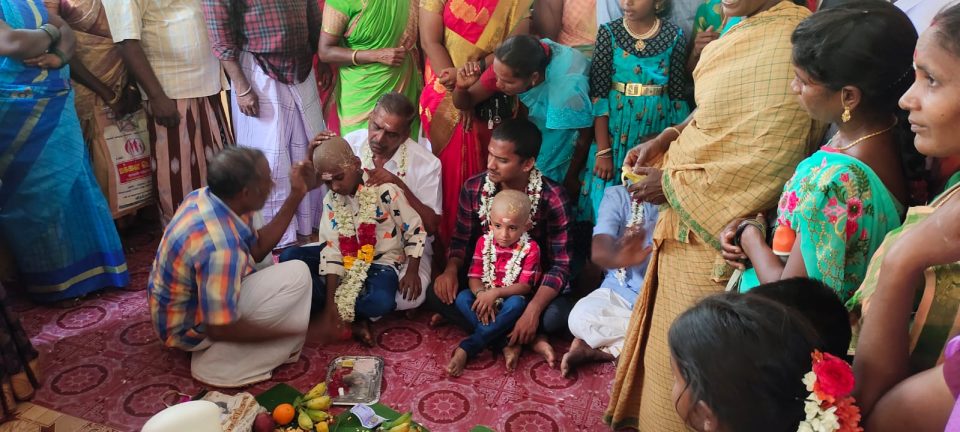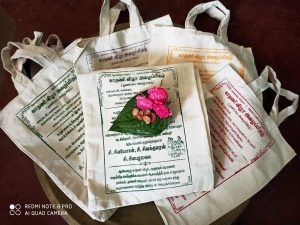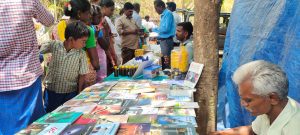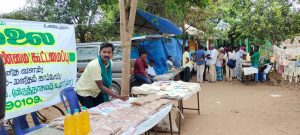
An ear-piercing ceremony with a strong message on organic farming
For a traditional function, a TN couple offered a feast with pesticide-free vegetables and grains, and put up awareness stalls

Is there a connection between ear-piercing (kathani vizha in Tamil) and organic farming? For most, there is little or no connection, but a couple in Virudhachalam recently organised an event connecting both to create awareness among farmers.
D Sivakumar and his wife Maniyarasi celebrated their three sons’ ear-piercing ceremony at the Sembaiyanar Kovil in Mudhanai, in Tamil Nadu’s Cuddalore district, with a feast featuring pesticide-free vegetables and grains that they cultivated themselves on their farm in Kotteri, Virudhachalam. The story, however, doesn’t end with the feast. In anticipation of a day-long awareness drive, the couple set up provisional stalls displaying native seeds, books and traditional farming materials as part of the function on the temple premises.
At least 700 people, including relatives and friends, participated in the event, which evoked tremendous response. Sivakumar chose April 6 for the ceremony, since the day marked the 84th birth anniversary of organic farming guru G Nammalvar (1938-2013).
A month ago, when the couple decided to organise the ceremony, they wanted to do it differently. They first printed the invitation with the day’s programme on a cloth bag to avoid the use of plastic. At least 1,000 such bags were sent to relatives and friends.

Sivakumar had learnt a lot about organic farming when he was working as a production manager in Singapore. He returned to his village in 2015, and then on started cultivating various crops and vegetables on his farm in Kotteri. He mainly cultivates cashew, millets and vegetables.
Though he followed in the footsteps of Nammalvar, many farmers in his village were using pesticides to get a better yield. This disappointed the young farmer, who also worked as a lecturer at the Vellore Institute of Technology.
Also read: How the Chalukyas and Rashtrakutas shaped south India
Creating awareness
“Ear-piercing ceremonies are normally limited to relatives and friends. When I decided to go a step ahead by including many awareness programmes as part of the event, many in the family were shocked. Normally, we invite people and they enjoy the feast and go. But I wanted to use the ceremony to create awareness among people about organic farming. My main targets were the farmers at the grassroots level. That’s why I put up a number of awareness stalls and interactive sections. I also chose the date [Nammalwar’s birth anniversary] so that people will understand the role played by the green crusader,” said the 39-year-old.

Sivakumar chose the Sembaiyanar Kovil in Mudhanai as the venue mainly because the premises of the old Ayyanar temple is an example of how nature and man coexist. However, the place has not been maintained well. Tourists throw plastic bags and other wastes in and around the lake adjacent to the temple. With the help of Tamil Kaadu, a voluntary organisation that promotes organic farming, Sivakumar first started cleaning the temple premises.
“After cleaning the premises, we put up stalls. My friends from various organisations helped me. I chose the place because it needed some attention,” he said.
Also read: How Indian forest-dwellers shaped urban economies of Asia
The attendees had plenty of activities awaiting them. Some checked out the books (related to environment and organic farming) and others discussed the advantages of organic farming with experts assembled there. There were stalls displaying native seeds and traditional materials used for framing.

Ramesh Karupaiah, a member of Tami Kaadu, said the ceremony was meaningful. “Our cultural system was very eco-friendly, but today it is more westernised. After globalisation, we have started giving importance to the western way of living. This is disruptive to our environment. The ear-piercing ceremony with a lot of awareness programmes was a great sense of environmental activism by Sivakumar, who himself is an organic farmer. If we can spread environmental messages through such ceremonies, it will create a lot of impact,” he said.
Also read: Six artists search for primordial deities in Tamil Nadu villages
All-round praise
The event evoked tremendous response and many farmers praised the couple for organising it. B Murugan, a relative, said: “I have been to many ear-piercing ceremonies, but never seen one like this. The native seed stall was very good. I got to know more about organic farming. The most interesting thing was how a normal family event turned out to be a great awareness creating exercise. It was a great experience.”
For Sivakumar, it was also an event to show his friends and relatives how one can organise such ceremonies without “wasting” money. “I used the grains and vegetables that I cultivated for the feast. Many of my friends and relatives helped me physically to clean the surroundings and put up stalls. I didn’t have to spend much, thanks to their cooperation. We should never waste money. If we do, then it is against our environment,” said Sivakumar.
“We need more such events to create awareness among people about our traditions,” said Tamil Kaadu’s Ramesh.

